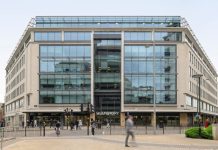Woodbourne Group has made significant additions to its senior management team to spearhead its life science expansion plans.
The team has been created as the company gears up to deliver Curzon Wharf – Woodbourne Group’s ground-breaking vision for a £360 million Birmingham waterfront ecosystem and the world’s first mixed-use net zero carbon ready development.
A key ingredient in the development is a 130,000 sq ft biocentre which will set the standard for life science provision in the city and across the region. Construction work is expected to start on site in early 2025.
Joining Woodbourne Group is Tes Adamou, head of life sciences, and David Lupson as non-executive. Ian Lynch has also joined as construction director.
Tani Dulay, chief executive of Woodbourne Group said: “We’ve assembled a first-class team to deliver on our promise of Curzon Wharf. We now also have the international standard of expertise of the life science market which will enable us to deliver on our plans to be the class leader in the sector.”
Tes Adamou has significant experience in project and programme management in the construction and property sectors, having led a multitude of projects in the life sciences and education spheres. He has played a pivotal role in the successful planning, delivery and leasing of £400 million life science schemes, as well as steering R&D campuses to GMP manufacturing facilities and higher education in the UK.
Tes is the CEO of EEDN, a comprehensive design and project management consultancy catering to the built environment, with a specialism in technically intricate life science projects. While maintaining his current position, his appointment ensures that Woodbourne Group secures exclusivity over the West Midlands region.
Ian Lynch, former development project manager at Lendlease where he worked on the Smithfield masterplan, has also joined Woodbourne Group. He has been appointed construction director with a special focus on delivering Curzon Wharf and major projects. Ian has led the planning, procurement, and execution of diverse mixed-use construction projects, cumulatively valued at over £750 million, encompassing residential, education, commercial, retail and leisure sectors.
David Lupson is one of the UK’s leading practitioners in the development and operation of life science laboratories. He engineered the UK’s inaugural commercial leased laboratory and contributed significantly to birthing Europe’s largest commercial life science cluster during his tenure. He has been instrumental in the successful business planning, delivery and leasing of over 2.5 million sq ft of commercial laboratory space including Cambridge Science Park, Newcastle Biosphere, Liverpool Science Park, Thames Valley Science Park and Edinburgh BioQuarter. David’s clients include GlaxoSmithKline, various city and county councils, Greater London Authority, the NHS, the Queensland government, Scottish government and a number of leading UK universities. David invests substantial effort in tracking market trends and assessing sector-wide achievements, both on a national and global scale.
Curzon Wharf has now received planning approval from Birmingham City Council and has been one of the most talked about schemes in the UK. It has been regularly supported by the leader of Birmingham City Council and the Mayor of the West Midlands and received attention from around the globe. The proposals include new residential buildings – including Birmingham’s tallest tower – shops and offices, as well as research and development and life sciences facilities on the one million sq ft site which is currently occupied by industrial units constructed in the 1960s.
Located next to Birmingham City University and Aston University and within the Birmingham Knowledge Quarter, it is within an eight-minute walk of the new HS2 Curzon Street Station. The development is expected to boost Birmingham’s economy by at least £151 million and create close to 1,400 jobs.
*A net zero carbon building is highly energy efficient and fully powered from on-site and/or off-site renewable energy sources.





















